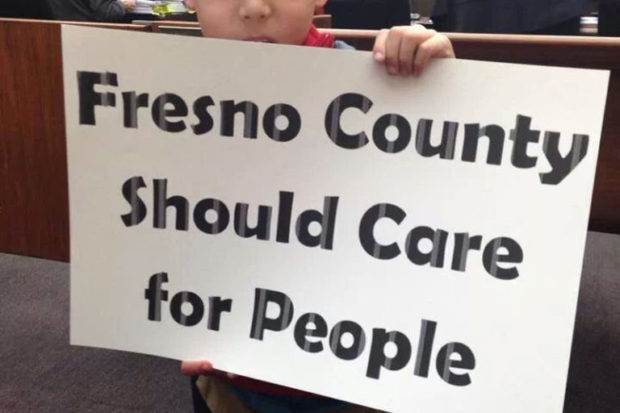
An impromptu survey of local community leaders revealed the following priorities for our county.
- Affordable housing
- Clean drinking water
- Clean air quality
- Climate change
- Economic development/career development
- Sheriff’s Office accountability re jail-related issues
- Spending state and federal money in accordance with priorities related to health, climate and transportation
Notice a common theme? These don’t seem to be the same priorities for the current Fresno County Board of Supervisors (BOS).
Take the May 3 meeting of the BOS. After the perfunctory recognitions and proclamations, the meeting lasted less than 20 minutes. Less than 20 minutes! And part of that time was spent praising former Raiders’ quarterback Daryl Lamonica.
And there was no mention of how the BOS plans to address the Attorney General’s concerns with the county’s General Plan.
“All of this continues because of supervisors’ lack of responsiveness to their constituents and the issues facing them,” said one of the survey respondents.
The supervisors’ work ethic improved somewhat at the May 17 meeting, largely driven by more than one hour of public comment, which forced adjournment to closed session past noon.
Supervisor Buddy Mendes pulled an item from the Consent Agenda relative to a housing initiative so that “we can at least talk about what we do.” Mendes referenced an event he had attended where someone told him the county did not do anything for housing.
Mendes then gave time to staff to discuss some housing units being provided through funding from No Place Like Home, a state program that eventually will create more than 500 units locally for permanent supportive housing for those in need of mental health services who are experiencing homelessness, chronic homelessness or are at risk of chronic homelessness.
Kudos to the BOS for letting staff move forward with this initiative, unlike the funding to study the effect of climate change on challenged communities that the BOS refused to accept.
Public comment at the May 17 meeting was particularly lively, lasting more than an hour. Three topics were prominent.
- Fresno County Public Safety Association Unit 2 workers, which includes juvenile correctional officers, adult correctional officers and county security guards, lobbied for a pay raise. The unit took a 9% cut during the Great Recession and has yet to get that compensation back. Many of these workers are referred to as “the forgotten” because they work behind walls and are not visible to the public.
- Several residents from Cantua Creek expressed concern about the cost and quality of their water; one resident said her bill is $225 per month. Also, the community has incurred debt relative to its water supply. Residents asked that the debt be waived by converting it to a loan with the County then forgiving the loan using ARPA (American Rescue Plan Act) funds.
- “Election integrity” folks resurfaced (see sidebar). They demanded a “forensic audit” while making non-specific accusations of election fraud.
Overall, the supervisors seem to have some misconception about their role, that is, being elected officials in government office. For example, with no sense of irony, Mendes said that “when it comes to government there’s no such thing as common sense.” And in reference to a recycling mandate from the state, Supervisor Steve Brandau said sarcastically that “government’s going to pat itself on the back for another great job.” Uh, wake-up call. You are the government. And until you start bringing solutions to the table, yes, you are part of the problem.
“They’re Back!”
By Michael D. Evans
Election deniers, under the guise of “election integrity,” were back in full force at the May 17 meeting of the Fresno County Board of Supervisors. Largely absent in recent months, they seem to have been reinvigorated by a recent movie release, 2000 Mules. This film alleges that an elaborate network of paid operatives violated election laws in the 2020 election by employing at least 2,000 “mules” to illegally collect ballots.
Speakers during public comment called for a “forensic audit” and made such claims as “the graveyard comes alive every election time” and “mail-in ballots were definitely a way of cheating in the election.” No evidence of any voter fraud—local or nationally—was provided aside from references to the film.
“The election of 2020 haunts the American mind,” says the filmmaker, Dinesh D’Souza, also a far-right commentator. “There is a wide swath of people who know in their gut that there was coordinated, massive fraud.”
That gut feeling and the film’s “evidence” have been widely discredited.
According to Politifact, the film “furthers the myth that something sinister occurred with mail ballots during the 2020 election. D’Souza told Fox News that ‘mules’ delivered 400,000 illegal votes. Experts say the evidence D’Souza points to is inherently flawed.”
Ali Swenson of the Associated Press says that 2000 Mules used “a flawed analysis of cell phone location data and ballot drop box surveillance footage to cast doubt on the results of the 2020 presidential election nearly 18 months after it ended.” He further tackles, and refutes, several claims made in the movie.
And an analysis by Philip Bump in the Washington Post says that the film “offers the least convincing election-fraud theory yet.”
“At its heart, 2000 Mules is a triumph of capitalism,” states Bump. “There’s huge demand for proving that Trump didn’t lose in 2020, and this film provides just enough of a veneer of authority to let people collapse comfortably into that belief.
“That it doesn’t survive even mild external scrutiny is as irrelevant as pointing out contradictions in a religious text is to recent converts: They want to believe what they want to believe.”
This return to the “election integrity” discussion leads us to ask the most obvious question about the 2020 election: How did Donald Trump get 11.2 million more votes than he got in 2016?
*****
Michael D. Evans is a political activist, editor and writer. Contact him at evansm@usa.net.

https://fresnoalliance.com/2022-primary-election-endorsement-grid-2/

